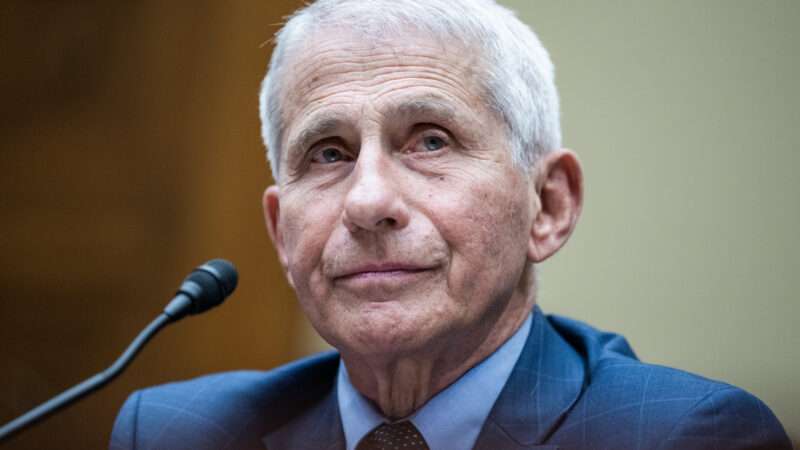
Anthony Fauci, top adviser on COVID-19 under both Presidents Donald Trump and Joe Biden, was in the hot seat this week, facing intense criticism from congressional Republicans as well as unending praise from congressional Democrats. Monday's hearing, organized by the House Oversight Committee's Select Subcommittee on the Coronavirus Pandemic, functioned as a quintessential example of the extreme polarization that characterizes modern U.S. political discourse; for half the country, Fauci is a villain—for the other half, he is worthy of sainthood.
Occupying the former camp, Rep. Marjorie Taylor Greene (R–Ga.) refused to call him by his medical title—instead referring to him as "Mr. Fauci"—and repeatedly said that he should be sent to prison. On the other side, Rep. Jamie Raskin (D–Md.) apologized to Fauci on behalf of his colleagues, chided the right for embracing "the big medical lie" that Fauci was somehow responsible for causing the pandemic, and then pointlessly turned the conversation toward Trump's recent felony conviction.
Dr. Fauci has devoted his entire career to public health and fighting infectious diseases. Based on lies, Republicans are treating him like a convicted felon—oops, I bet he wishes they'd treat him like a convicted felon! pic.twitter.com/8jxV5QPZJm
— Rep. Jamie Raskin (@RepRaskin) June 4, 2024
When asked about the hearing during an interview on CNN, Fauci said that Greene's irresponsible rhetoric would increase the number of death threats he receives.
"There are a segment of the population out there that believe that kind of nonsense," he told CNN's Kaitlan Collins.
Let's agree that neither Fauci, nor any other person in public life, should face death threats. At the same time, no one should be prevented from going after a public official simply because doing so is likely to send encouraging signals to more aggressive and irritating critics. Arguments to the contrary tend to be incredibly one-sided, in any case: Mainstream media figures often attack right-wing figures for directing death threats their way, while ignoring the fact that the right-wingers also receive death threats when subjected to media scrutiny. Irresponsible rhetoric, and accompanying threats of violence, ought to be condemned in both directions—but no one should feel obligated to pull their punches just because there are a lot of angry people on the internet.
The Prison Doctor
We should also agree that calls to imprison Fauci are, at best, premature. He has not been convicted of any crime; moreover, his misguided pandemic policies are not prosecutable. Critics are right to call out his ever-shifting opinions on the efficacy of masks, his downplaying of post-infection immunity vs. vaccine-related protection, and his six-feet social distancing guidance, which he now admits had little scientific basis and was essentially invented on the spot. Government officials who propose bad policies should be voted out of office or fired as appropriate. They cannot be jailed, however.
Fauci's role in the alleged lab leak cover-up is a different matter. As Reason's Christian Britschgi documented in his write-up of the hearing, it is now well-established that Fauci's straightforward denial to Sen. Rand Paul (R–Ky.) regarding U.S. funding of gain-of-function research was at best misleading—and potentially an outright lie. (Lying to Congress is, in fact, a crime.) David Morens, a top Fauci deputy, has admitted to thwarting journalistic inquiries by making certain emails invisible to Freedom of Information Act requests. There are serious questions about whether Fauci pushed scientific experts in his orbit to embrace the natural spillover explanation of COVID-19's origins, possibly because the lab leak explanation would have invited greater scrutiny of U.S. health bureaucrats and their research priorities. I interviewed Paul this week about Fauci's role in suppressing the lab leak theory, and he stated that he's come to believe the National Institutes of Health are "more secretive than the CIA."
But whether Fauci has actually made himself criminally liable is beyond the point. It's abundantly clear that he did not deserve the abject hero worship he received throughout the pandemic. (Remember the Fauci candles?) His COVID-19 prevention policies are extremely suspect, his public advocacy for scientific enhancement of pathogenic viruses is incredibly concerning, and his attempts to control the narrative about the pandemic's origins are inexcusable. Just watch this terrific roundup by Matt Orfalea of all the times Fauci denied the lab leak theory, despite now maintaining that he never expressed a strong opinion one way or the other.
This Week on Free Media
I'm joined by Amber Duke to discuss Fauci's evasiveness, Jen Psaki's advice for Biden, and criticism of Manhattan District Attorney Alvin Bragg.
Worth Watching
I just started HBO's Hacks, which has already run for three seasons. I'm not sure why it took me so long. I'm a big fan of series lead Jean Smart, who delivered two of my favorite TV performances: the delightfully unhinged First Lady Martha Logan on later seasons of 24, and superhero-turned-vigilante-hunter Laurie Blake on Watchmen.
In Hacks, Smart stars as Deborah Vance, an aging star and stand-up comedian who reluctantly takes a canceled TV writer, Ava Daniels, under her wing. Daniels, portrayed by Hannah Einbinder, is obnoxiously unlikable, but receives frequent enough comeuppance to keep the series entertaining.
The post Anthony Fauci Is Not a Hero appeared first on Reason.com.







